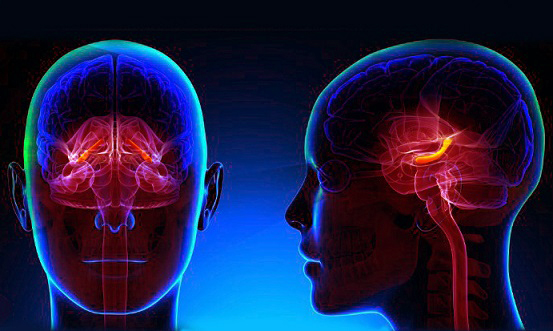Nikhil Prasad Fact checked by:Thailand Medical News Team Dec 27, 2024 11 months, 3 weeks, 6 days, 5 hours, 23 minutes ago
Medical News: Recent research has uncovered compelling evidence about the neurological impacts of SARS-CoV-2, the virus responsible for COVID-19. A groundbreaking study led by scientists from Central South University in China, along with collaborators from other leading institutions, has identified a direct link between the virus’s membrane (M) protein and neurodegeneration. This
Medical News report delves into the study’s findings and their implications for understanding the neurological complications associated with COVID-19.
 SARS-CoV-2 Membrane Protein Induces Hippocampal Atrophy and Neurodegeneration
Investigating the Neurological Symptoms of COVID-19
SARS-CoV-2 Membrane Protein Induces Hippocampal Atrophy and Neurodegeneration
Investigating the Neurological Symptoms of COVID-19
Neurological complications have been a critical concern throughout the COVID-19 pandemic. Studies have revealed that approximately 60% of hospitalized patients with COVID-19 experience neurological symptoms. These symptoms range from cognitive decline and memory issues to more severe conditions such as increased risk for Alzheimer’s disease. While the presence of SARS-CoV-2 in the central nervous system (CNS) has been confirmed through autopsies, the mechanisms behind these effects remained largely unknown until now.
Using advanced methods, researchers from Central South University and collaborating institutions in China employed Drosophila (fruit flies) and mouse models to analyze the effects of SARS-CoV-2’s structural proteins. They discovered that the M protein, among other proteins, had the most profound impact on neuronal health.
The Role of the M Protein in Neurodegeneration
The study systematically examined the impact of SARS-CoV-2’s structural and accessory proteins in Drosophila models. The team found that the M protein disrupted mitochondrial functions, leading to significant neuronal damage.
Mitochondria are critical for energy production and cellular health. Disruption in their function caused a cascade of effects, including mitochondrial fragmentation, reduced ATP (cellular energy) production, increased production of reactive oxygen species (ROS), and eventually cell death.
In mouse models, the M protein was shown to induce hippocampal atrophy - a hallmark of neurodegeneration - and neural apoptosis. Notably, these effects were even more pronounced in a specific Alzheimer’s disease mouse model known as 5xFAD. The hippocampus, a region of the brain crucial for memory and learning, was particularly vulnerable to the M protein’s effects.
Mechanism of Action
The M protein’s primary mechanism involved disrupting the interaction between the Golgi apparatus and mitochondria within cells. The Golgi apparatus, an essential cellular structure, interacts with mitochondria to regulate various functions. The researchers identified that the M protein impaired this interaction, leading to mitochondrial dysfunction. Further analysis revealed that the M protein’s effects were mediated through a specific molecular pathway involving the enzyme PI4KIII&a
mp;beta;, which plays a role in cellular signaling and membrane dynamics.
By inhibiting PI4KIIIβ activity, the researchers were able to mitigate the harmful effects of the M protein. This finding opens a potential avenue for therapeutic strategies targeting SARS-CoV-2’s impact on the CNS.
Broader Implications for Neurological Health
The study also explored the M protein’s effects on neuroinflammation. In mouse models, the expression of the M protein activated microglia and astrocytes, two types of brain cells involved in immune responses. The activation of these cells can exacerbate inflammation, leading to further neuronal damage.
In addition, the M protein’s expression was associated with changes in behavioral and cognitive functions in mice. Mice exhibited increased anxiety-like behaviors and impaired memory, as evidenced by tests such as the Y-maze and novel-object recognition tasks. These behavioral changes align with clinical observations of COVID-19 patients experiencing cognitive and psychological symptoms.
Study Findings
The researchers utilized a range of advanced techniques to confirm their findings. Key highlights include:
-Mitochondrial Dysfunction: The M protein caused fragmentation and structural abnormalities in mitochondria, leading to reduced energy production.
-Increased Cell Death: Both Drosophila and mouse models showed significant neuronal apoptosis in response to the M protein.
-Hippocampal Atrophy: Mouse models revealed marked shrinkage of the hippocampus, a critical brain region for memory.
-Behavioral Impacts: Mice expressing the M protein displayed deficits in memory and cognition, mirroring symptoms observed in human COVID-19 patients.
-Therapeutic Insights: Inhibiting PI4KIIIβ, a key enzyme affected by the M protein, reduced its harmful effects.
Conclusions
The study provides critical insights into the neurological complications of COVID-19. By identifying the M protein as a key factor in neurodegeneration, the research highlights a potential target for therapeutic interventions. The findings suggest that SARS-CoV-2’s impact on the CNS extends beyond acute infection, with potential long-term consequences for survivors.
The implications of this research are significant, as they offer a deeper understanding of how the virus affects the brain. The study’s use of both Drosophila and mammalian models ensures that its findings are robust and applicable across species. Moreover, the identification of PI4KIIIβ as a mediator of the M protein’s effects opens new possibilities for drug development aimed at mitigating neurological symptoms associated with COVID-19.
As the pandemic continues to evolve, understanding its broader health impacts remains crucial. This research underscores the importance of addressing the neurological dimensions of COVID-19 and highlights the need for continued investment in studies exploring the virus’s long-term effects on health.
The study findings were published in the peer-reviewed journal: Translational Neurodegeneration.
https://link.springer.com/article/10.1186/s40035-024-00458-1
For the latest COVID-19 News, keep on logging to Thailand
Medical News.
Read Also:
https://www.thailandmedical.news/news/cases-of-subdural-empyema-among-patients-recovering-from-covid-19
https://www.thailandmedical.news/news/covid-19-accelerates-brain-and-immune-aging
https://www.thailandmedical.news/news/latest-american-study-validates-that-brain-changes-linked-to-long-covid-symptoms
https://www.thailandmedical.news/news/romanian-study-warns-that-covid-19-increases-risk-of-brain-bleeding
